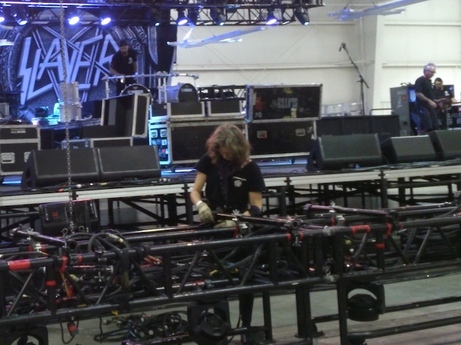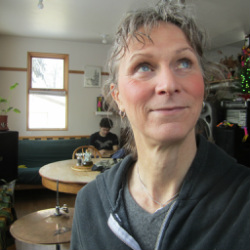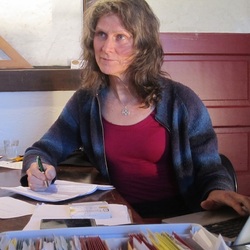 Me working a Slayer concert, 2013, photo by K. Maddison
Me working a Slayer concert, 2013, photo by K. Maddison Any life transition can make some friends and family uncomfortable, but changing your gender triggers strong reactions in most people. In our society visibly trans* individuals are subject to the kinds of behaviour and comments that most people have learned are no longer tolerated for other social groups. Disrespectful behaviour is unfortunately very common in respect to transitioning people, and it does hurt, sometimes profoundly. Some of it is intentional, but much of it is not. In our strongly gender binary society, we learn from an early age to classify every person we meet into one of the two genders. We exaggerate gender differences, and establish stereotypes in order to make it easier to distinguish. There is some evidence from anthropology that seems to suggest this tendency is stronger in patriarchal societies, and is linked to the imbalance of power between the genders. People’s identities are strongly invested in the system, trying to maintain their position in the hierarchy. An admission of change, or of the arbitrariness of gender categories could cause some men to lose dominance, or to experience guilt, and women to be painfully aware of their subjugation.
The most common is mis-gendering in the use of pronouns and honourifics. A shop clerk for example, ringing up my purchases and seeing me dressed in a skirt and wearing makeup, will say “Is that all, Sir?” At work, the crew of a touring show would begin seeing and treating me as a woman and referring to me as she. Then a conversation would take place, such as one of the road crew asking, “Where‚’s Miki, I thought she was ironing those shirts?” and one of my co-workers who has known me for a long time would answer without thinking,”He’s gone to get some water for his iron.” Then, the local crew would begin to see me in a new way and soon everyone would be referring to me as he. You would think that people are so good at assessing all the myriad characteristics; physical, behavioural and self-presentational, that they would be able to tell whether a person wants to be perceived as male or female. However, because of this deep-seated need to maintain the gender system, almost all of us unconsciously gender people according to their birth, or biological sex if we have detected, of had brought to our attention some slight indication that it may not coincide with their perceived, preferred gender. I’ve experience it in my own thinking. If I find out that someone I have only known as female was identified as male at birth, suddenly previously unnoticed male characteristics in that person will become obvious, and I may even have trouble for a while as some unconscious part of my brain begins insisting on supplying male pronouns for that person. This takes a real effort to overcome, especially when someone is beginning their transition, or has strikingly gendered physical attributes, or habitual gendered behaviours that they are unable to change.
It’s even harder when you have known someone for a long time as one gender to begin to see them as another. In addition to our socially conditioned discomfort about gender change, we usually have a strong emotional investment in our view of those we know, their gender, and how it relates to us. Reading my previous post (which is to be continued), you may have been struck by the incidents of people, some very close to me, reacting badly to my gender transition. These reactions can really hurt, but those of us who are trying to change how our gender is perceived have to learn how to be understanding, and to have patience. It takes time. Sometimes a long time, or never, if a person is unwilling to admit the reality that perceived gender can be different than physical sex, perhaps feeling it is a mental illness that could have been prevented or can be cured. Perhaps they feel it is impossible because of their religious beliefs, or because it goes ‘against nature’, ignoring the fact that nature is full of examples of the spectrum of sexual characteristics and gender behaviour found in all species. Sometimes it just takes time for them to accept that the change in behaviour and presentation is permanent. It can be very hard to accept especially at first, when we who are transitioning often show behaviour that is exaggeratedly different from our previous gendered behaviour in order to compensate, before finding a balance. The difference between the new persona and preconceptions of how we used to be can make friends perceive us transitioning individuals as insincere, or unauthentic. If, perhaps as a reaction to these perceptions, our friends and family shun contact with us, they become stuck and invested in a particular version of their memory of us, and can’t get past the unfamiliar changes to see that we are the same person they knew, often more authentic and open than ever before in our lives.
It was hard for my sisters and brothers in my Union. For years I had been working with them only occasionally, when the very big touring musicals came to town, as I was working during the 90s as a theatre consultant in Barcelona, and then full time at my job at the museum, the one from which I was fired in 2011 because of the discomfort of those co-workers at my gender expression. While I was recovering from my nervous breakdown I worked very little for the Union, and selectively, only accepting jobs that wouldn’t cause me stress, such as working on the wardrobe crew for musicals and dance groups, which I love. This was during the previous tenure of the Business Agent I began this post describing, when he was resistant to accepting me as female. He was replaced as BA by another, who, as I began seeking more work, proved to be an ally. The Union was asked by an employer to provide a camera operator for a conference, and though my experience was limited, and from long ago, he recommended me for the position. I turned out to have a talent for the job, but the employer was uncomfortable, and began criticizing my hairstyle, and clothing, and asking the BA to supply another camera operator. The new BA was very supportive, and told the employer he could talk to human rights. Over time the employer became accustomed to me, and now I am his preferred camera operator, and have gained further experience working for other employers as part of multi-camera live broadcast teams, work I really enjoy.
Despite the camera work, and my radically reduced expenses after being asked to leave my family home, I still wasn’t earning quite enough to cover my expenses, and once my termination ‘gag money’ and Employment Insurance sickness benefits ran out in early 2013, I had to become less selective in the jobs I accepted. I began taking regular stage work calls, beginning with a two day stage maintenance call at the Auditorium. It was a small crew of some of the senior members of the Union, 5 men and myself, plus the 3 full time stage technicians. Men who had known me for more than 20 years before my transition. They treated me badly, putting me to the ‘test’ by assigning me the most difficult, dirtiest tasks. Particularly two of them, the roughest, most misogynist guy in the local, and the man I mentioned at the beginning of this post. They told macho jokes and used lewd innuendos. I plugged in all the lamps on a lighting batten, and one came along and re-did them because I had done them ‘wrong’. (The head lighting technician later confirmed I had done them right). I tied a clove hitch in a lifting rope, and the other man re-tied it with the same knot. And so on. I kept a cheerful front, but was in tears by the time I got home.
The morning after the second day, emotionally and physically exhausted, I reflected on the experience. I had survived, and my elbow which I had injured, and made chronic because of a severe dance routine a couple of years previously was alright. I could do it again, if it weren’t too many days. I realized something important. Our Union had in fact been comparatively supportive, ‘allowing’ women to operate projection equipment and work at traditionally male stage jobs already in the 1980s, not only in the wardrobe department, and far earlier than many other stage locals and other professions. I had always been aware of the way female stage workers were treated. As I reflected on my experience, I realized I had been treated by my male co-workers as a woman. They weren’t treating me badly because I was queer, sexual diversity is accepted in theatre. Unpleasant as their treatment of me had been, and despite the illogic of them behaving as though I had somehow lost my ‘male’ work skills on coming out as female, it slowly dawned on me that I had finally been accepted by them, not as trans, but as female.
A year later, when our tolerant and supportive Business Agent was replaced by the previous one, the one I mentioned at the beginning of this post, who had treated me badly and who I had treated badly when I was a scenic designer many years ago, I was worried that he wouldn’t be as supportive if employers were uncomfortable with me being transsexual, and that he would be reluctant to recommend me for jobs such as female dresser in the Wardrobe Department. So while we were waiting for the band to finish their encores, before load-out, I asked if I could have a word with him. We stepped into the hall, and I reminded him how in the past he had wanted official confirmation of my female status. I dug through my purse, and pulled out my driver’s license, and showed it to him, pointing out the ‘F’ for female. He told me it was alright, he didn’t need that. I insisted, it wasn’t for him, it was so he would know I had it in case any employers complained about me. He said, “If anyone gives me any shit, I’ll tell them they can go to hell.” He then went on to explain. After he had told me that he felt I needed official proof of being female a couple of years before, he had begun to think about it. He had gone on the internet, and researched the subject during a couple of days, maybe a week. And everything pointed to one conclusion. I was a girl. End of story.




 RSS Feed
RSS Feed